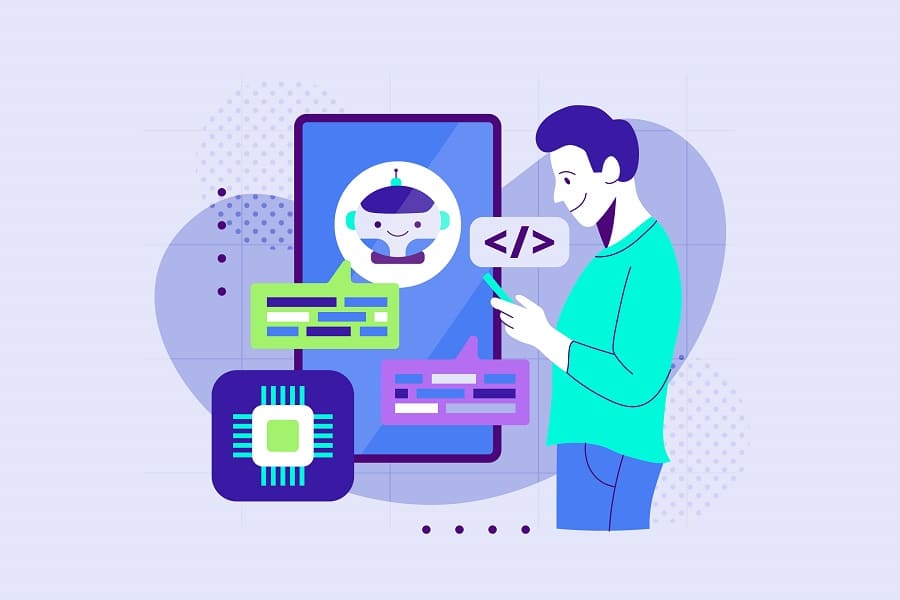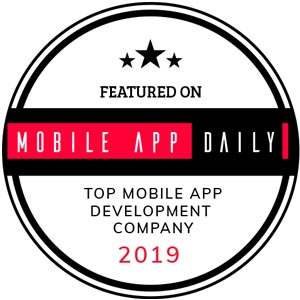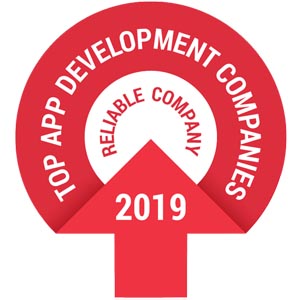Artificial intelligence has been around for many years and has been used in a number of industries. In general, the entire artificial intelligence market is estimated to be worth $150.2 billion in 2023 alone. Projections estimate that the market will grow exponentially by 2030 with estimates that it will reach $1,345.2 billion. With this kind of growth expectation, it stands to reason that we should take a closer look at what precisely artificial intelligence tools mean in the space of building mobile applications.
From helping to write mobile application code to helping to improve efficiency and accuracy, artificial intelligence is changing the landscape of mobile application development. Below, we take a closer look at some of the specific artificial intelligence tools that are being used to create standout mobile apps.
An Introduction to Artificial Intelligence (AI) and Its Application in Building Mobile Applications
Before we get into more specifics, let’s take a closer look at what exactly AI is and what its application really means when it comes to building mobile applications.
Artificial intelligence, at its most basic, is essentially a simulated version of human intelligence. AI thinks in a similar manner to how humans think and it works to copy actions that we take. Think of AI like this: it’s essentially the ability that a computer has to perform tasks that we do.
AI are not passive machines. They are able to make both predetermined and mechanical responses based on their programming and how they learn. This makes them an invaluable tool in mobile application development.
AI tools help mobile app developers in a variety of ways including:
- Providing developers and clients with predictive analysis
- Providing an improved end-user experience
- Improving mobile app security
- Streamlining the overall development process
- Improving functionality during development and launch
Advantages and Disadvantages of Each AI Tool for Building Mobile Apps
Now with an idea of how AI tools help mobile app developers, we can take a closer look at some specific AI tools that are commonly used in mobile app development. Below is a brief overview of AI-based tools for building mobile apps such as React Native, Flutter, and Xamarin, and some of the advantages and disadvantages they have.
React Native
An open-source UI software framework that was developed by Meta (Facebook).
React Native has a number of advantages such as being cost effective and allowing for resource optimization that allows teams to optimize budgets further. The framework is easy to work with, and provides code reusability, and quick iteration cycles – allowing developers to quickly build and test mobile apps on different platforms for feedback.
Disadvantages of React Native include:
- Updates to React Native can be somewhat complex.
- Since React Native is not native development. It is a cross-platform framework based on JavaScript, so troubleshooting issues within an app may be more difficult.
- Complex user interfaces are typically not the best to create in React Native.
Flutter
A free, open-source framework created by Google.
As an open-source framework, Flutter is accessible to a large community that is constantly working to evolve its capabilities. Its quick development cycle allows developers to quickly see changes to mobile apps in real-time. AI can also be used in combination with Flutter to build powerful mobile apps.
Disadvantages of Flutter include:
- A steep learning curve for developers new to the framework.
- More limited third-party libraries.
- It’s still considered to be a newer framework.
Xamarin
A free app platform that is open-source and cross-platform.
Perfect for developers who are creating apps on iOS and Android, Xamarin allows teams to use one technology stack to code across all platforms. The performance put out by apps developed with this platform is close to native and there is open-source technology as well. Xamarin apps can make use of AI tools as well, like chatbots and automated tasks.
Disadvantages of Xamarin include:
- There can be delayed support for new platform updates.
- Depending on the app type, apps made with Xamarin may run larger.
- Occasionally there are compatibility issues with third-party tools.
With these types of mobile app frameworks allowing developers to make use of AI tools, it’s easy to see how artificial intelligence is having such a massive impact in the mobile app development space.
What is the Best AI for Building an App?
There is no one definitive AI tool that is perfect for building an app. This isn’t just a cop-out answer either. The best AI tool for building an app is something that a mobile app development team will be able to determine after they fully understand what kind of app a client is in need of.
What is the AI tool for creating Android Apps?
Android’s own AI tool, Machine Learning, can be effective for creating Android apps. Other tools we may use alongside a mobile framework like Xamarin or Flutter include:
- Google AI
- Android’s Studio Bot
- OpenCV
What is the AI tool for Creating iOS Apps?
Similar to creating Android apps, there are several AI tools we can use in addition to the framework we deem the most suitable for a project including:
- OpenCV
- Core ML by Apple
- ML Kit by Google
How to Choose the Right AI Tool for Creating Your Mobile App
With such a variety of AI tools available now, it can be overwhelming trying to choose the right AI tool on your own. That’s where an experienced mobile app development company like Split Reef comes in.
Our team is able to look at key details like:
- Your budget
- Your project requirements
- What kind of user interface you want
- Integration capabilities
- Overall impact the tool will have on the development process
Choosing the right AI tool for creating a mobile application will depend on the little details! There is no perfect tool for every single project as each project is going to be different.
Connect with a Trusted Mobile App Development Company
If you are looking to connect with a trusted name in the mobile app development space, look no further than Split Reef. With offices located in Columbus, Ohio and Jacksonville, Florida, our team is here to help create a mobile application that suits all of your needs. We know all of the common mistakes to avoid when using AI tools for developing mobile apps by keeping ourselves up to date on the latest developments in mobile app development, including AI tools.
To learn more about how we can help and about our best practices for using AI tools to build mobile apps, reach out today.
You can connect with us over the phone or online for a completely free quote today.

Split Reef is a modern, results-driven digital organization always ready to support clients in their search for digital supremacy. With Split Reef, your budget isn’t going to hold you back from partnering with us to make your project successful. Our offices are located in Columbus, Ohio and Jacksonville, Florida.










